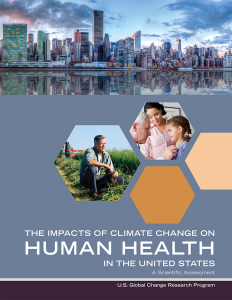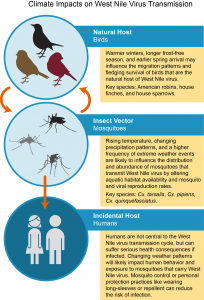 On April 4, 2016, the White House Office of
Science and Technology Policy released a report titled The Impacts of
Climate Change on Human Health in the United States: A Scientific
Assessment. This assessment provides public health
decision-makers at every level of government with more definitive
and, where possible, quantitative assessments of the national
burden of health impacts projected under climate change. The
report concludes that climate change is a significant threat
to the health of the American people, exacerbating existing
health threats and creating new challenges.
The U.S. Global Change
Research Program developed this scientific assessment as
part of the ongoing efforts of its sustained National Climate
Assessment process, as called for under the President’s
Climate Action Plan. This assessment significantly advances
what we know about the impacts of climate change on public
health and the confidence with which we know it.
On April 4, 2016, the White House Office of
Science and Technology Policy released a report titled The Impacts of
Climate Change on Human Health in the United States: A Scientific
Assessment. This assessment provides public health
decision-makers at every level of government with more definitive
and, where possible, quantitative assessments of the national
burden of health impacts projected under climate change. The
report concludes that climate change is a significant threat
to the health of the American people, exacerbating existing
health threats and creating new challenges.
The U.S. Global Change
Research Program developed this scientific assessment as
part of the ongoing efforts of its sustained National Climate
Assessment process, as called for under the President’s
Climate Action Plan. This assessment significantly advances
what we know about the impacts of climate change on public
health and the confidence with which we know it.
Institute Activities
CICS-NC staff, along with colleagues from NOAA’s National
Centers for Environmental Information (NCEI), played pivotal
roles in the development of this report.
Report Authors
 Four Institute staff members served as authors on the report,
joining a team of more than 100 experts.
Jesse Bell, a CICS-NC research scholar who also works with the
Centers for Disease Control and Prevention on projects related
to climate and health, was a lead author on the Impacts of
Extreme Events on Human Health chapter of the assessment.
CICS-NC colleagues Carl Schreck III and Jennifer Runkle served
as contributing authors on that same chapter.
Kenneth Kunkel served as a contributing author on the Introduction: Climate Change
and Human Health chapter and the Modeling Future Climate Impacts on Human Health appendix.
Four Institute staff members served as authors on the report,
joining a team of more than 100 experts.
Jesse Bell, a CICS-NC research scholar who also works with the
Centers for Disease Control and Prevention on projects related
to climate and health, was a lead author on the Impacts of
Extreme Events on Human Health chapter of the assessment.
CICS-NC colleagues Carl Schreck III and Jennifer Runkle served
as contributing authors on that same chapter.
Kenneth Kunkel served as a contributing author on the Introduction: Climate Change
and Human Health chapter and the Modeling Future Climate Impacts on Human Health appendix.
Assessment Development and Production
Building on experience gained through supporting the development
of the Third National Climate Assessment, CICS-NC staff provided
a range of expertise that was essential to the development and
delivery of the climate and health assessment. Working as part
of NCEI’s Assessments Technical Support Unit, contributions
included project management services, science editing and
copyediting, and graphic design. CICS-NC staff also developed
the assessment’s engaging, interactive website. Institute
data experts and software engineers helped ensure openness and
transparency in the report by facilitating the collection and
delivery of a range of metadata.
To view the full report, visit the assessment’s interactive
website at health2016.globalchange.gov.
For a synopsis of the key findings from the assessment, download
the Executive Summary.
View a video of the White House announcement of the report:
 On April 4, 2016, the White House Office of
Science and Technology Policy released a report titled The Impacts of
Climate Change on Human Health in the United States: A Scientific
Assessment. This assessment provides public health
decision-makers at every level of government with more definitive
and, where possible, quantitative assessments of the national
burden of health impacts projected under climate change. The
report concludes that climate change is a significant threat
to the health of the American people, exacerbating existing
health threats and creating new challenges.
The U.S. Global Change
Research Program developed this scientific assessment as
part of the ongoing efforts of its sustained National Climate
Assessment process, as called for under the President’s
Climate Action Plan. This assessment significantly advances
what we know about the impacts of climate change on public
health and the confidence with which we know it.
On April 4, 2016, the White House Office of
Science and Technology Policy released a report titled The Impacts of
Climate Change on Human Health in the United States: A Scientific
Assessment. This assessment provides public health
decision-makers at every level of government with more definitive
and, where possible, quantitative assessments of the national
burden of health impacts projected under climate change. The
report concludes that climate change is a significant threat
to the health of the American people, exacerbating existing
health threats and creating new challenges.
The U.S. Global Change
Research Program developed this scientific assessment as
part of the ongoing efforts of its sustained National Climate
Assessment process, as called for under the President’s
Climate Action Plan. This assessment significantly advances
what we know about the impacts of climate change on public
health and the confidence with which we know it.
 Four Institute staff members served as authors on the report,
joining a team of more than 100 experts.
Jesse Bell, a CICS-NC research scholar who also works with the
Centers for Disease Control and Prevention on projects related
to climate and health, was a lead author on the Impacts of
Extreme Events on Human Health chapter of the assessment.
CICS-NC colleagues Carl Schreck III and Jennifer Runkle served
as contributing authors on that same chapter.
Kenneth Kunkel served as a contributing author on the Introduction: Climate Change
and Human Health chapter and the Modeling Future Climate Impacts on Human Health appendix.
Four Institute staff members served as authors on the report,
joining a team of more than 100 experts.
Jesse Bell, a CICS-NC research scholar who also works with the
Centers for Disease Control and Prevention on projects related
to climate and health, was a lead author on the Impacts of
Extreme Events on Human Health chapter of the assessment.
CICS-NC colleagues Carl Schreck III and Jennifer Runkle served
as contributing authors on that same chapter.
Kenneth Kunkel served as a contributing author on the Introduction: Climate Change
and Human Health chapter and the Modeling Future Climate Impacts on Human Health appendix.
